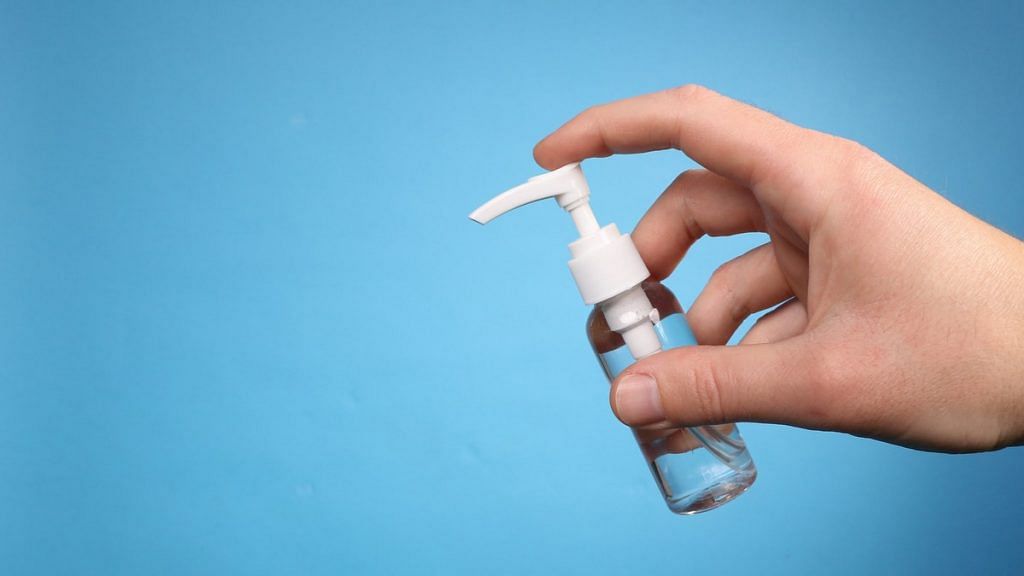New Delhi: In its fight against the Covid-19 pandemic, India may have ramped up production of essential gear, like personal protective equipment (PPE) kits, masks, testing kits, ventilators and alcohol-based hand sanitisers to meet domestic requirements, but it is facing shortage on an unexpected front.
Dispenser pumps used in sanitiser bottles are proving to be a stumbling block in India’s quest for self-reliance in its Covid-19 battle.
So far, dispenser pumps were mainly imported from China. India has been looking for ways to successfully increase its production within the country, but has had only limited success.
Though not an expensive item, costing around Rs 5-20, and relatively small in size, these pumps have as many as 16 components each mainly made of plastic. This has made it difficult to step up its production in India with economies of scale tilted towards importing this part from China.
Different wings of the government are brainstorming on how to tackle this problem, said a secretary in one of the government departments in know of the developments.
“Sanitisers, to be effective, need at least 70 per cent alcohol. We have taken care of this by using ethanol, manufactured in sugar industries and distilleries, for producing sanitizers. But the dispenser pump is imported from China,” said the official, who didn’t wish to be named.
“In India, maybe one or two manufacturers make it, which is not enough to meet the domestic requirement. Now, we are trying to make it in India through small and medium enterprises,” the official said.
The Ministry of Micro, Small and Medium Enterprises (MSMEs) is working with firms to see how India can manufacture them within the country and at competitive pricing, said the official. “The government is working to develop an alternative.”
Also read: Indian banks need capital, stronger balance sheets to take on Covid crisis, Uday Kotak says
The China puzzle
At a time there is growing clamour for boycotting Chinese products from the Swadeshi lobbies and the self-reliant pitch by the government, the struggle to produce these dispenser pumps locally reflects India’s growing dependence on China for many of its daily use products and the challenges to replicate their scale of production thereby ensuring competitive pricing.
In a response to the shortage of dispenser pumps locally, India banned exports of alcohol-based hand sanitisers in containers with dispenser pumps through a notification on 1 June. However, no restrictions were imposed on exports of alcohol-based hand sanitiser in any other packaging.
China has the largest share in India’s imports, followed by the US and the oil producing countries of the UAE and Saudi Arabia.
Nearly 14 per cent of India’s imports in 2018-19 were from China, valued at $70 billion. This increased marginally in the April-January period of 2019-20, trade data showed. In comparison, the US’ share in India’s imports was at around 7 per cent in 2018-19 and at 7.5 per cent in the first ten months of 2019-20.
From net importer, India may become big exporter of PPE, ventilators
In his address on 12 May, Prime Minister Narendra Modi had urged Indians to go “vocal for local”, stressing the need for local manufacturing. This entails not only buying locally manufactured products but also promoting them, he had said.
Modi had also highlighted how India managed to ramp up production and produce 2 lakh PPE kits and N-95 masks each day. “When the Corona crisis started, not a single PPE kit was made in India. The N-95 masks were produced in small quantities in India,” he pointed out, adding this was how India turned this crisis into an opportunity.
In an address at industry lobby group Confederation of Indian Industry last week, Modi urged industries to make in India for the world.
As of now, India produces 4-4.5 lakh PPEs per day and 2.5 lakh N-95 masks per day.
The official quoted above said that currently there are 600 domestic companies whose samples have been approved for making PPEs.
Besides PPEs and N-95 masks, India is also ramping up production of ventilators and ventilator components.
“In India, ventilators were mostly imported and used to cost Rs 15 lakh to Rs 16 lakh, making treatment expensive. But on account of the huge requirements and the scarcity globally, the government is working to manufacture it domestically,” the official said. “The government has tied up with some companies in Bengaluru, Delhi and Andhra Pradesh who manufacture ventilators. Some start-ups have also been encouraged to make ventilator components.”
The official added that the ventilators that are being made in India will cost anywhere between Rs 2 lakh to Rs 5 lakh. “They will be of comparable global standards,” the official added. India presently has a requirement of 65,000-70,000 ventilators.
Also read: India to see recession due to worsening consumption, investment demand: Monetary policy panel
